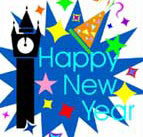December:New Year's Day(新年)
(单词翻译:单击)
| New Year's Day |
| January 1 |

10...9...8... The lighted ball in New York'sTimes Square(时代广场)startspicking up speed(加快速度). 7...6...5... It's almost time. 4...3...2... Everyone holds their breath for the last few seconds. We're about to jump that seemingly large but invisible gap that separates the years. 1...0... Happy New Year! We made it. The old year, for better or worse, is gone for good. The new year has begun with fresh promise. Here's our chance to start again, to do it right this time, to have another shot at success...at glory...at just accomplishing what we resolve to. It's time to shed that baggage from the year long gone and celebrate what can be in the 365 untouched days to come. Happy New Year! We can trace the origins of a new year's celebration back to the ancient Egyptians and Babylonians, at least 4,000 years ago. In Egypt, the Nile river signaled a new beginning for the farmers of the Nile as it flooded their land and enriched it with thesilt(淤泥)needed to grow crops for the next year. This happened near the end of September. The Babylonians held their festival in the spring, on March 23, to kick off the next cycle of planting and harvest. Symbolically1, the king was stripped of his robes and sent away for a few days while the peoplewhooped it up(庆祝). He then returned in all hisfinery(华丽的服饰)for a grand parade, and the normal activities of life would return for the new year. So how did we get to January 1 as the start of the year? That date was picked by the Roman Emperor Julius Caesar when he established his own calendar in 46 BC. The Roman Senate had actually tried to make January 1 New Year's Day in 153 BC, but it wasn't until Caesar stretched out 47 BC for 445 days that the date we're familiar with wassynchronized(同步)with the sun. We've been on the Julian calendar ever since.
Around the world, different cultures have their own traditions for welcoming the new year. The Japanese hang a rope of straw across the front of their houses to keep out evil spirits and bring happiness and good luck. They also have a good laugh as the year begins to get things started on a lucky note. In West Bengal, in northern India, the people like to wear pink, red, purple and white flowers. Women favor yellow, the color of spring.Hindus(印度人)also leave shrines5 next to their beds so they can see beautiful objects when they wake up to the new year. In Vancouver, British Columbia, Canadians enjoy the traditional polar bear swim. People of all ages don their swim suits and take the plunge6, an event that is sure to get you started in the new year with eyes wide open. A fairly new tradition that is starting to spread worldwide is a community celebration of the visual and performing arts on New Year's Eve. Started in Boston in 1976, an organization called First Night promotes alcohol-free festivals in 186 American cities, 16 in Canada, plus Hastings, New Zealand and Greenwich, England. Typical experiences include ice sculptures, dancing, storytelling, theater, poetry, films and, at the stroke of midnight, an elaborate fireworks display. Best wishes to you and your loved ones for a happy and prosperous New Year! |
 收听单词发音
收听单词发音
1
symbolically

|
|
| ad.象征地,象征性地 | |
参考例句: |
|
|
|
2
symbolizing

|
|
| v.象征,作为…的象征( symbolize的现在分词 ) | |
参考例句: |
|
|
|
3
Christians

|
|
| n.基督教徒( Christian的名词复数 ) | |
参考例句: |
|
|
|
4
winding

|
|
| n.绕,缠,绕组,线圈 | |
参考例句: |
|
|
|
5
shrines

|
|
| 圣地,圣坛,神圣场所( shrine的名词复数 ) | |
参考例句: |
|
|
|
6
plunge

|
|
| v.跳入,(使)投入,(使)陷入;猛冲 | |
参考例句: |
|
|
|

 There must be something inside of us that needs to unload the accumulated results of fate and our own decisions and start anew. The Romans knew this. The month of January was named for their god, Janus, who is pictured with two heads. One looks forward, the other back,
There must be something inside of us that needs to unload the accumulated results of fate and our own decisions and start anew. The Romans knew this. The month of January was named for their god, Janus, who is pictured with two heads. One looks forward, the other back, 


